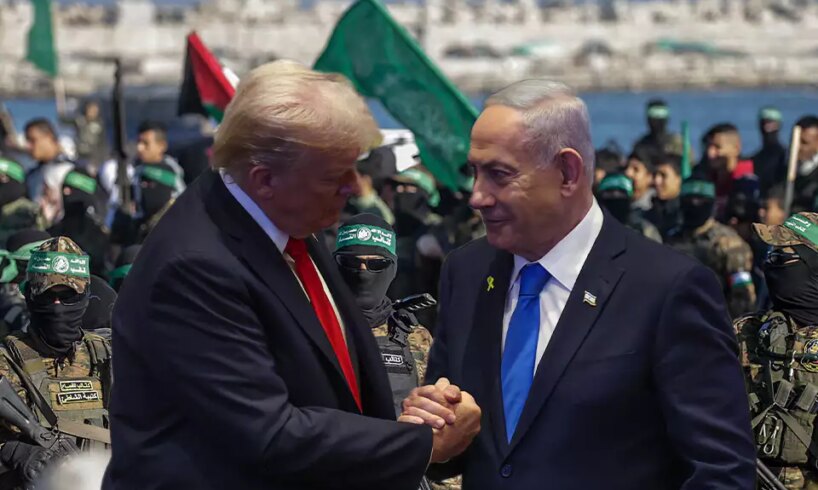
Tens of thousands of demonstrators who gathered again on Saturday at Hostages Square reminded everyone that the struggle is not over: 13 deceased hostages are still being held in the Gaza Strip, as Hamas deliberately evades returning them to Israel.
This weekly reminder is important not only as an expression of solidarity with the hostages’ families, but because the deal that ended the Gaza war is being only partially implemented. While Israel has met all of its commitments in this phase, the other parties, and there is more than one, are dragging their feet. That is true of Hamas, and it is also true of the agreement’s sponsors, who are not pressing Hamas on the hostage issue and are in no hurry to move on to the next stage.
Hamas terrorist. Photo: EPA
Hamas is taking advantage of this time to reorganize in Gaza. Ostensibly this is for the sake of maintaining law and order — or, in its preferred terminology, “governance” — but its eyes are already set on the future: either preparing for renewed combat or ensuring it is better positioned for the moment when it will have to cede control. Hamas appears willing to do so on the civilian side, meaning to let someone else deal with Gaza’s daily hardships.
When it comes to its military wing, however, there is no indication that it intends to disarm. Israel raises these issues daily with the various American “babysitters” currently in the country. So far, it was met with only limited success.
Washington reiterates its commitment to bringing all hostages home and to removing Hamas from power, but beyond rhetoric, it is not posing any real threat to Hamas’ rule, and it is blocking Israel from doing so. The US demand that any significant Israeli military action, other than a local immediate response, be coordinated in advance, reveals its suspicion that Israel is looking for a pretext to resume the fighting, and its intention to prevent that.
A troubling picture
These are not even the worst of Israel’s problems. The deal forced upon it, as senior US administration officials now openly acknowledge, has created a precedent: for the first time in the history of the Israeli-Palestinian conflict, Washington has effectively become a direct party to it. For decades, Israel resisted such intervention, insisting that the two sides must resolve their differences on their own, a position long supported by the US, Europe and even key Arab states.
Now Israel has cornered itself into a situation where others are managing the conflict on its behalf. For now, this applies to Gaza, but talks are already underway in the background on a “two-state solution.” President Donald Trump and his vice president, JD Vance, have made clear that there will be no annexation of Judea and Samaria, while Trump is openly flirting with the idea of releasing Marwan Barghouti from prison so he can lead the Palestinians in the future.
Marwan Barghouti. Photo: AFP
With Turkey and Qatar now being drawn into this mix, there are real concerns over whether Israel’s vital interests will be maintained. The Israeli public, meanwhile, is far less aware of this troubling reality, subjected instead to a steady barrage of messaging that paints a different picture.
The government is now seeking to tighten control over what information the public receives, including through communications legislation being advanced by Communications Minister Shlomo Karhi. This is a continuation of its efforts to bend democratic norms for its own purposes and ensure its political survival.
The end of the war was supposed to bring about the establishment of a state commission of inquiry, as well as a resolution to the issue of ultra-Orthodox military conscription in line with the needs of the IDF. Worryingly, the government is seeking distorted, self-serving solutions to both, contrary to the public interest.
In doing so, it betrays not only the enormous price paid during the war, but also its central mission going forward. It is leaving the IDF to grapple alone with all the problems, the operational challenges in Gaza, the debriefings, the need to replenish thinning combat ranks, thereby completing the familiar cycle of recent years: the successes are the government’s, while the failures and burdens fall on others.





